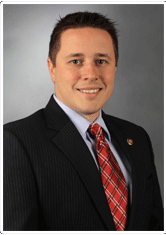JEFFERSON CITY, Mo. – Gov. Jay Nixon signed seven bills on Monday, including one to combat the ever-growing crime of identity theft and another that will allow domestic violence victims to keep their cell phone numbers when they leave their abusers.
Nixon signed Senate Bill 642 with the aim of curbing identity theft, a law that will criminalize the knowing possession of fraudulently obtaining credit or debit cards. The laws currently on the books do not allow charges to be brought against those who have stolen credit card information unless evidence exists that the information has been used.

“Identity theft is a real and growing problem, and that’s why I’m pleased the General Assembly came together in a bipartisan way to strengthen our laws in this area,” Nixon said in a written statement. “By criminalizing the possession of stolen credit card information, this bill will provide law enforcement with another took to hold hackers and identity thieves accountable.”
The bill, sponsored by Sen. Doug Libla, R-Poplar Bluff, also clarifies that stealing against a financial institution is a class B felony regardless of whether force is used.
Libla said Tuesday that law enforcement officials are finding multiple cards belonging to other people during arrests for other violations. Gaming officers are also coming into contact with people at casinos who have numerous cards belonging to other individuals, he said.

“This is not currently illegal, unless the cards are stolen or the individual uses the card,” Libla said. “With the passage of SB 624 our law enforcement officials will have another tool available to serve and protect the public from hackers and identity thieves.”
In separate legislation, the Democratic governor also signed Senate Bill 838 to help victims of domestic violence by allowing them to retain their cell phone numbers and services separate from the wireless accounts of their abusers. Under the legislation, full orders of protection will permit wireless service providers to transfer the victim’s cell phone service to a new account where they can keep their wireless services and associated telephone numbers.
That bill was sponsored by Sen. Ryan Silvey, R-Kansas City, who said Tuesday it was truly a bipartisan effort in a legislative session that saw much discord and famously included a 40-hour filibuster.
“This is one of those rare examples where everything just clicked,” Silvey said. “There was no partisan fight and everybody was on the same page. This is the first year the bill was offered and it just sailed through.”

Silvey said the issue was brought to light when a top-tier wireless provider approached lawmakers and said it was not legally allowed to transfer cell phone numbers used by victims of domestic violence because oftentimes the contract was in the name of the person who was abusing them.
“So when the victim would try to leave, it would just add to the hurdles,” Silvey said. “This just solves a number of problems. Our cell phones and smartphones have become such a part of our identity, it’s important that victims be able to have continuity as they end these abusive relationships.”
The governor also signed:
- House Bill 1443 allowing LAGERS (Missouri Local Government Employees Retirement System) member political subdivisions to move prior non-LAGERS retirement plans into the LAGERS retirement system. HB 1443 addresses problems identified by the Governor in a previously vetoed version of the bill.
- House Bill 1530, which brings Missouri into compliance with federal laws requiring the collection of certain unemployment debt through the Treasury Offset Program and requiring that 15 percent of any assessed penalty be paid into the Unemployment Compensation Fund, a benefit fund;
- House Bill 1593, to exempt county collectors from the 10 penalty for untimely distribution of taxes collected if the taxes are subject to a taxpayer protest or disputed assessment;
- House Bill 1721, modifying the manner and frequency in which a supervisory committee of a credit union verifies its member accounts so it conforms to the manner and frequency proscribed in federal law; and
- Senate Bill 660, which changes the amount that banking corporations or associations bidding to become the depositaries of the funds of a county are required to submit to not less than $2,500.












